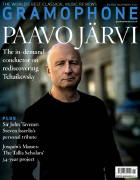Texte paru dans: / Appeared in: |
|
|
Outil de traduction (Très approximatif) |
|
|
Reviewer:
David Vickers Vivaldi’s pasticcio was commissioned by Verona’s Accademia Filarmonico for their recently built theatre during the 1734-35 Carnival. The manuscript score (now in Turin) is titled Il Bajazet, whereas the Verona libretto was published as Il Tamerlano. The Sinfonia and many arias were recycled from the Red Priest’s own operas, the recitatives were composed afresh, and eight numbers are by Giacomelli, Hasse, Broschi and Porpora. Nevertheless, the Turin source has five lacunae that are filled in here by musicologist Bernardo Ticci, whose solutions are different from those devised by Fabio Biondi (for Virgin) and Erin Helyard (Pinchgut Opera). Naïve lists the sources of all the music after the tracklisting; it takes quite a bit of disentangling, but Reinhard Strohm’s concise essay is expertly lucid. Accademia Bizantina play crisply in the Sinfonia, and Ottavio Dantone nurtures versatile textures in the diverse arias. Filippo Mineccia’s quick precision characterises Tamerlano’s imperious authority (‘In sì torbida procella’); the tyrant’s attempt to woo his prisoner Asteria (‘Vedeste mai sul prato’) is sung unevenly but the countertenor excels in haughty disdain at the disguised Irene’s criticisms of his infidelity (‘Cruda sorte, avverso fato’) and spiteful revenge on discovering that Andronico and Asteria are lovers (‘Barbaro traditor’). Delphine Galou’s fluency and soulfulness are well-suited to Asteria’s emotional conflict between personal and political relationships: her scorn for Andronico’s protestations is dramatised vividly in ‘Stringi le mia catene’; the climax of the opera is Asteria’s seething report of her father’s suicide and her own venomous fury hurled at Tamerlano (‘Svena, uccidi, abbatti, atterra’, which Vivaldi might have interpolated into a production of Tamerlano in Milan in 1727). Andronico’s predicament caught between a rock and a hard place is characterised sympathetically by Marina De Liso: the siciliano ‘Quel ciglio vezzosetto’ and the limpid ‘Non ho nel sen costanza’ are shaded gracefully, and De Liso sings superbly in the trippingly elegant ‘La sorte mia spietata’ and heroic ‘Spesso tra vaghe rose’. Bruno Taddia’s over-aspirated coloratura in Bajazet’s arias is less persuasive than his scathing condemnation of Asteria’s agreement to marry their captor Tamerlano (‘Dov’è la figlia?’) and his brief angst-ridden exit to commit suicide entirely offstage. Tamerlano’s jilted bride Irene is performed feistily by Sophie Rennert, whose searing melismatic singing is at the forefront of the valorous ‘Qual guerriero in campo armato’; her tense lament ‘Sposa son disprezzata’ is laced with icy determination, and the celebration of her reclaiming Tamerlano’s promise of marriage features delightful pastoral recorders that represent a loyal turtle dove (‘Son tortorella’). Arianna Vendittelli’s virtuoso singing is dazzling in ‘Anch’il mar par che sommerga’. Accademia Bizantina’s immersive interpretation is a compelling advocacy for the patchwork opera’s merits. |
|




